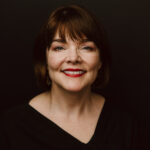SCHOOL OF ARTS & SCIENCES – CENTRAL TO THE MISSION OF PROVIDENCE COLLEGE
I am pleased to introduce you to Dr. Margaret Watkins who joined our college community as Dean of the School of Arts & Sciences in July 2023. She is from Virginia originally, and her undergraduate degree in philosophy was from the College of William and Mary (home of the first Phi Beta Kappa chapter—founded in 1776!). Dr. Watkins earned her PhD in philosophy from the University of Notre Dame.
Although Margaret is a “newbie” to the college, she considers PC to be her home and a very special place. In our recent conversation, she shared her passion for the liberal arts, their impact on students’ lives well beyond the college years, and very practical ways students can enhance their programs through multiple disciplines. I hope you will pass this information on to your friars, as well.
Jackie
The School of Arts & Sciences aligns closely with the overall mission of PC in that it focuses on an interdisciplinary approach to education designed to develop students who are innovative thinkers, compassionate citizens, and visionary leaders. How do the depth and breadth of courses in the sciences, arts and humanities, and social sciences translate into the everyday lives of our students?
This happens in so many different ways across our disciplines. What they have in common, I believe, is expanding students’ perspectives. It is wonderfully impossible to predict the connections students will make between what they are studying, what they are seeing happening in the world, and what they are integrating into their inner lives.
It is becoming increasingly clear that human problems require interdisciplinary solutions: a public health challenge, e.g., needs scientists to explain the physical nature of the challenge, a humanist to help us understand the historical precedents and the moral factors of the situation, a social scientist to analyze the analogous patterns and large-scale impacts, and an artist to help us communicate solutions and persuade action.
For me, however, the ongoing gifts of a liberal education are the consolation it offers, in helping us to detach from our narrow experience and reflect on the human condition, and the new ways of seeing that education makes possible. I have never looked at human faces in the same way since I took a drawing class in college.
In regard to the world of work, what competitive advantage do you see that a PC graduate might have with a second major or minor in arts and sciences. Are there some typical career paths or examples that you could share?
We hear over and over again that hiring managers tire of candidates who seem like carbon-copies of one another. Cultivating interest and expertise in multiple areas opens up possibilities for different ways of thinking about problems and real topics of conversation, the importance of which is underestimated!
The possibilities here are endless. One that I love to talk about is our Spanish for Health Professions minor. A healthcare provider who can speak to a patient in their native language is not only more employable; they have the opportunity to help people in a profound way in the most difficult moments in their lives. To put in a plug for my home discipline, Philosophy is a great double major for almost anything: philosophy majors learn how to construct and analyze arguments and engage challenging ideas. It’s a natural pairing with computer science, legal studies, or anything, really.
I know you have a significant amount of faculty within the School of Arts & Sciences doing some remarkable research outside the classroom. What kinds of opportunities exist for students to partner with faculty in their research endeavors?
Student research is baked into many of our programs, and we see many faculty who publish articles and give presentations with their students. The sciences are important here: students work in the lab with their professors, but it goes beyond this to the generation of research questions and the dissemination of the results.
But it isn’t just the sciences. Our Public and Community Service Studies faculty bring students into community-engaged research projects. (You can read about it here.) One of our Spanish professors had a student interested in a writer, and she and the student interviewed her together and published the interview in an international journal. Our students are not just research assistants; they are active partners in the research process.
Can you please tell us about any upcoming events, new initiatives, or programs that parents might want to share with their students. Also, who can students seek out to learn more about programs and opportunities within your school?
We are excited about some new majors opening up in the near future, including the Data Science major, which students can declare now. We have several upcoming cultural opportunities, including concerts sponsored by the Department of Music and a theatrical production beginning April 4. Students should check their “Morning Mail” for more information.
As far as learning about programs and opportunities, students should know that their faculty love to share these things with them! If they are interested in something but don’t know where to find it, suggest that they ask any one of their professors or their faculty advisor. We absolutely love it when students express interest and will go out of our way to help.
More information about the School of Arts & Sciences can be found at: https://arts-sciences.providence.edu/

Margaret Watkins, PhD
Professor of Philosophy
Dean of The School of Arts & Sciences
mwatkin1@providence.edu





